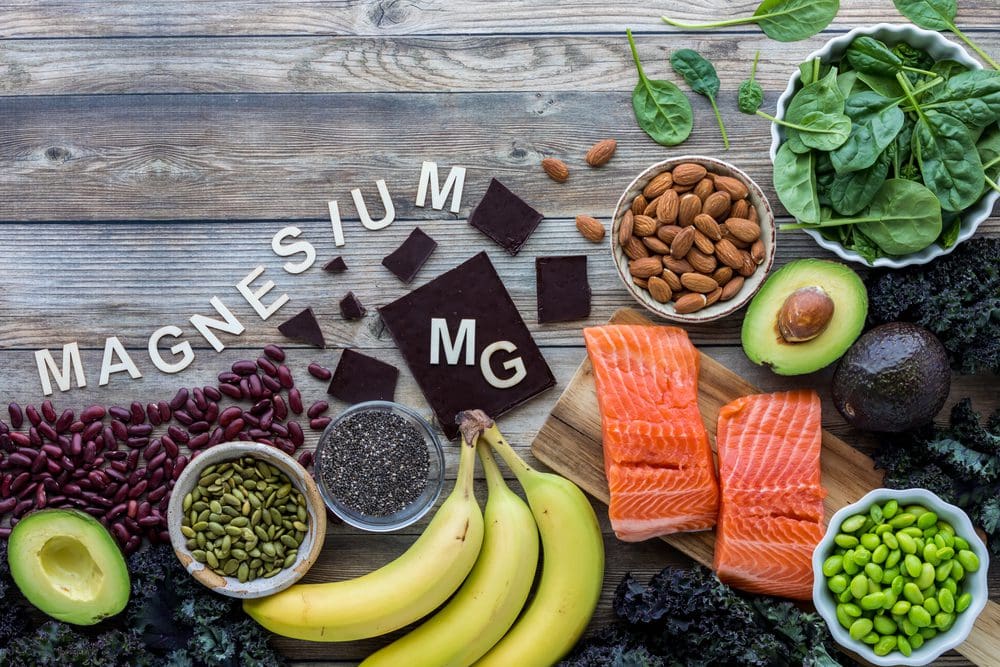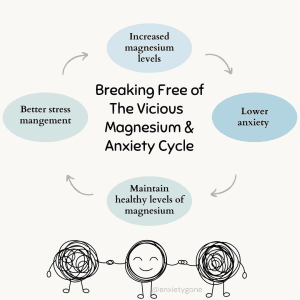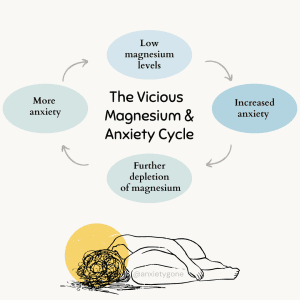Full Disclosure: Clicking on these links could mean a tiny commission for me, at no extra cost to you.
Dealing with anxiety can be overwhelming and like many of us out there, you too are likely on the search for effective solutions that don’t come with a laundry list of side effects. Turning to nature’s remedies, like magnesium supplements, not only offers a gentler approach but also aligns with your desire to nourish the mind and body. But what may shock you the most is the impact that having low magnesium can have your mental, physical and emotional health. As you’re about to discover in this article, taking magnesium for anxiety disorders has a trickling effect that extends to all aspects of your health.
Here’s a sneak peek:
- Best for Magnesium Glycinate supplements → 88Herbs
- Best for Magnesium Citrate supplements → Webber Naturals
- Best for Magnesium Taurine supplements → CanPrev
- Best for Magnesium Threonate supplements → Organika
- Best for Magnesium Malate supplements → Naka
- Best for All-In-One → The Farm Haven
- Best for Magnesium Chewables → BrainMD
- Best for Magnesium Lotion → Magnum Solace
- Best for Magnesium Spray → Nuvo
- Best for Magnesium Bath Salts → Anxiety Gone
What is Magnesium?
Magnesium is an essential mineral involved in over 300 biochemical reactions in the body. It helps with muscle and nerve function, keeps your heart rhythm steady, supports a healthy immune system, and strengthens bones. Magnesium also plays a key role in energy production, regulating neurotransmitters, maintaining mental health and the list goes on. Blood pressure, mood, sleep quality, you name it, magnesium can help.
How to Get Magnesium
Magnesium can be obtained from various sources, making it easy to incorporate this essential mineral into your diet or supplement routine. Dietary sources of magnesium include leafy green vegetables like spinach, kale, and Swiss chard, as well as nuts and seeds such as almonds, cashews, and pumpkin seeds. Whole grains like brown rice, oatmeal, and quinoa are also rich in magnesium, along with legumes such as black beans, chickpeas, and lentils. Fruits like bananas, avocados, and figs, as well as fish like salmon, mackerel, and halibut, also provide good amounts of magnesium, as well as dairy products like yogurt and milk are beneficial.
- Leafy Green Vegetables: Such as spinach and kale.
- Nuts and Seeds: Including almonds, cashews, and pumpkin seeds.
- Whole Grains: Such as brown rice and oatmeal.
- Legumes: Including black beans and chickpeas.
Some food products are fortified with magnesium, such as certain cereals, nutritional bars, and beverages, so checking the labels can help you find these enhanced options.
Magnesium can also be absorbed through the skin using topical products, like magnesium lotions and magnesium sprays. These sources of magnesium can be applied directly to the skin for targeted relief, and Epsom salts (magnesium sulfate) can be added to bath water to help relax muscles and relieve stress.
By incorporating a mix of these sources, you can ensure you get enough magnesium to support your overall health and well-being.
Types of Magnesium Supplements
If getting enough magnesium from food is challenging, as it is for up to 50% of us according to research, magnesium supplements offer a convenient alternative.
There are various forms of magnesium supplements with each providing its own set of unique benefits. For example, magnesium citrate is known for its high absorption rate and effectiveness in addressing a magnesium deficiency, whereas magnesium glycinate is preferred for its calming effects and good bioavailability. Magnesium oxide is commonly used as well but has lower absorption compared to other forms, while magnesium chloride is effective for quickly raising magnesium levels in the body.
Here is a quick breakdown of the different absorption rates and effects:
- Magnesium Citrate: Known for its high bioavailability.
- Magnesium Glycinate: Often recommended for its calming effects.
- Magnesium Oxide: Commonly used for its laxative properties.
- Magnesium Chloride: Known for its ability to increase cellular magnesium levels.
Ready To Boost Your Mental Health
88 Herbs offers the finest, high-quality ingredients trusted by thousands for better mental health and well-being. They’re offering our readers an exclusive discount using code “AnxietyGone”
How Magnesium Helps with Anxiety
Understanding how magnesium helps with anxiety is the first step to harnessing the benefits this natural remedy has to offer.
1. Calming Effects
Magnesium plays a crucial role in regulating neurotransmitters, the chemicals that transmit signals in the brain. It specifically influences GABA (gamma-aminobutyric acid), a neurotransmitter known for its calming effects. When GABA levels are balanced, your mind feels more at ease, and anxiety levels drop. Think of GABA as your brain’s natural brake system, and magnesium helps ensure this system functions smoothly.
2. Helps Your Stress Response
Another significant aspect is magnesium’s involvement in the hypothalamic-pituitary-adrenal (HPA) axis, which controls your body’s stress response. When you’re stressed, the HPA axis releases hormones like cortisol. Chronic stress can overwork this system, leading to persistent anxiety. Magnesium helps regulate the HPA axis, reducing the excessive release of stress hormones and helping you manage anxiety more effectively.
3. Improves Sleep
There is also a strong connection between magnesium and anxiety. Magnesium helps relax muscles and calm the nervous system, making it easier to fall asleep and enjoy restful, restorative sleep. Adequate sleep, as we know, is a critical factor in managing anxiety.
4. Reduces Inflammation
Magnesium also has anti-inflammatory properties, which is vital because chronic inflammation can contribute to anxiety and other mental health issues. By reducing inflammation, magnesium helps protect the brain and supports overall mental health.
5. Reduces Triggers
It’s important to note that a magnesium deficiency can actually trigger anxiety. Modern diets often lack in magnesium-rich foods, leaving many of us unknowingly deficient. At the very least, research has shown that many of us have low levels of magnesium and not yet a “deficiency” per se.
6. Breaks the Anxiety Cycle
One aspect of using magnesium for anxiety that is going to shock you the most is how it can break you free of the anxious cycle.
- → Based on studies, we are already low on magnesium.
- → Low magnesium levels lead to higher stress and increased anxiety.
- → However, when we are stressed out our bodies go through magnesium levels quicker.
- → This leaves you with even lower magnesium in your system, causing you to feel anxious, further depleting your magnesium.
This may explain why studies have found a strong correlation between low magnesium levels and an increased risk of anxiety and depression. It’s an ongoing cycle that can, however, be broken by including magnesium supplements in your daily routine.
Signs of Low Magnesium Levels
Identifying a magnesium deficiency, or low levels of magnesium, can be crucial for maintaining your mental health, as well as your overall health and well-being. Low levels of magnesium can manifest in various ways, affecting both physical and mental health.
Symptoms of low magnesium levels include:
- Frequent muscle cramps, twitches, and spasms can be a sign of low magnesium levels.
- Persistent tiredness, fatigue, and general weakness can indicate a magnesium deficiency.
- Mental health issues, such as increased anxiety, irritability, mood swings, and even depression.
- Sleep problems, such as difficulty falling asleep, staying asleep, or experiencing restless sleep.
- Heart palpitations or irregular heart rhythms, known as arrhythmias.
- High blood pressure and hypertension.
- Muscle weakness and an overall lack of strength.
- Unexplained nausea and vomiting.
- A decreased appetite or changes in eating habits.
- Feelings of numbness, tingling, or pins and needles, especially in the extremities, can indicate low magnesium.
- Chronic headaches and migraines.
If you are experiencing any of these symptoms of low magnesium, it’s important that you speak with your doctor.
Scientific Evidence Supporting Magnesium for Anxiety
Research indicates that magnesium may help reduce anxiety for all kinds of people, including those with generalized anxiety disorder (GAD), mild anxiety and even premenstrual syndrome (PMS)-related anxiety. Studies have also shown that magnesium supplements can improve mood, reduce the physical symptoms of anxiety, and enhance overall mental health.
Here are some additional evidence-based benefits you can expect when taking magnesium for anxiety:
- Helps alleviate anxiety and mood swings associated with premenstrual syndrome.
- Significantly reduces symptoms of anxiety in both adults and children.
- Helps regulate the body’s stress response by modulating the hypothalamic-pituitary-adrenal (HPA) axis, reducing the release of cortisol (your stress hormone).
- Influences neurotransmitters, such as GABA, which play a crucial role in anxiety regulation. Proper levels of magnesium help maintain a balance of these neurotransmitters, promoting a calming effect.
- Consistent magnesium intake is associated with lower anxiety levels over time, potentially preventing anxiety.
- Improves sleep quality due to reduced anxiety levels.
- Can be as effective as some pharmaceutical medications for anxiety, with fewer side effects.
- Can reduce systemic inflammation, which is often linked to anxiety and other mood disorders.
Reading to take control of your mental health?
Shop the premium supplements from 88 Herbs! Say goodbye to uncertainty and hello to trust with our carefully sourced, high-quality ingredients. Use code ‘AnxietyGone’ for an exclusive discount and invest in your well-being with confidence. Shop now and prioritize your mental health with 88 Herbs!”.
Best Magnesium Supplements for Anxiety
Choosing the right magnesium supplement is crucial for effectively managing anxiety. Different forms of magnesium have unique properties and absorption rates, making some more suitable for anxiety relief than others. Here’s a detailed look at the best magnesium supplements for anxiety:
1. Magnesium Glycinate
Magnesium glycinate is a combination of magnesium and glycine, an amino acid that promotes relaxation and sleep. It is easily absorbed by the body and is known for its calming effects.
As such, it is often recommended for reducing anxiety and improving sleep quality. Additionally, magnesium glycinate is gentle on the stomach, making it a good option for those with sensitive digestive systems. It’s typically taken in doses of 200-400 mg daily, but it’s best to follow specific dosage recommendations from a healthcare provider.
Buy Now: Available on Amazon
2. Magnesium Citrate
Magnesium citrate is a combination of magnesium and citric acid. It’s widely used due to its high bioavailability and effectiveness. This form of magnesium is well-absorbed by the digestive tract, making it an efficient way to boost magnesium levels quickly. It can help alleviate anxiety symptoms by supporting neurotransmitter function and reducing muscle tension.
This type of magnesium can have a mild laxative effect, which can be beneficial for those who experience constipation. However, this property may not be suitable for everyone. Typical dosages range from 200-400 mg per day.
Buy Now: Available on Amazon
3. Magnesium Taurate
Magnesium taurate is a compound of magnesium and taurine, an amino acid that supports cardiovascular health and has calming effects on the nervous system.
It is known for its ability to penetrate the cell membranes and provide a calming effect on the brain and body. Taurine has additional benefits for heart health and can help reduce symptoms of anxiety by modulating the nervous system.
This form of magnesium is often used in doses of 125-500 mg daily, depending on individual needs and tolerance. It is generally well-tolerated without causing digestive upset.
Buy Now: Available on Amazon
4. Magnesium Threonate
Magnesium threonate is a form of magnesium that is particularly effective at crossing the blood-brain barrier, making it beneficial for cognitive function and mental health.
It is known for its potential to enhance brain health, improve memory, and reduce anxiety. Its ability to enter the brain efficiently makes it a strong candidate for treating anxiety and other cognitive issues.
This form is usually taken in doses of 1,000-2,000 mg per day, though it’s best to follow specific dosage instructions from a healthcare provider due to its potency.
Buy Now: Available on Amazon
5. Magnesium Malate
Magnesium malate is a combination of magnesium and malic acid, an organic compound that plays a role in energy production. This form of magnesium is known for its energy-boosting properties and can help reduce symptoms of chronic fatigue, which often accompanies anxiety. Magnesium malate can also help improve mood and reduce muscle pain.
Typical dosages range from 300-600 mg daily. It’s generally well-tolerated and can be taken with or without food.
Buy Now: Available on Amazon
Choosing the Right Magnesium for Anxiety Supplement
When selecting a magnesium supplement for anxiety, consider factors like absorption rate, tolerance, and any additional benefits the supplement might offer. You may also wish to consult with a healthcare provider to determine the most appropriate type and dosage for your specific needs.
Below are our top recommendations for each type of magnesium for anxiety:
- Best for Magnesium Glycinate supplements → 88Herbs
- Best for Magnesium Citrate supplements → Webber Naturals
- Best for Magnesium Taurine supplements → CanPrev
- Best for Magnesium Threonate supplements → Organika
- Best for Magnesium Malate supplements → Naka
- Best for All-In-One → The Farm Haven
- Best for Magnesium Chewables → BrainMD
- Best for Magnesium Lotion → Magnum Solace
- Best for Magnesium Spray → Nuvo
- Best for Magnesium Bath Salts → Anxiety Gone
Comparing Magnesium to Other Supplements for Anxiety
While taking magnesium for anxiety is beneficial, it is not the only supplement that can help. You can view the most popular supplements for anxiety, but some of the top ones include:
- L-Theanine: An amino acid found in tea leaves, known for promoting relaxation.
- Ashwagandha: An adaptogenic herb that helps reduce stress and anxiety.
- Valerian Root: Commonly used for its calming effects and to improve sleep quality.
Potential Side Effects of Magnesium Supplements
While magnesium is generally safe, excessive intake can lead to side effects such as diarrhea, nausea, and abdominal cramping. It’s important to follow dosage recommendations and consult with a healthcare professional before starting any new supplement.
You amy also want to consider non-buffered magnesium bisglycinate if you are taking oral magnesium supplements. The non buffered form is the most absorbing, and least likely to cause loose stool. The majority of magnesium glycinate and bisglycinate on the market have actually been mixed with (buffered with) magnesium oxide which degrades the quality (and absorption).
Non-buffered means that the magnesium hasn’t been mixed with anything.
Conclusion
Taking magnesium for anxiety is a step in the right direction when it comes to natural remedies for managing anxiety. By understanding magnesium’s’ role in the body, exploring different forms of magnesium supplements and making additional lifestyle changes, you can effectively reduce anxiety symptoms and improve your overall mental, physical and emotional health. Plus, evidence shows magnesium supplementation can be just as effective as prescription medication for mental health conditions like anxiety and depression, and you just can’t go wrong with that.
Frequently Asked Questions (FAQs)
- What is the best form of magnesium for anxiety?
Magnesium glycinate is often recommended for its high absorption rate and calming effects. - How long does it take for magnesium to work for anxiety?
It may take several weeks to notice the full benefits of magnesium supplementation for anxiety. - Can you take magnesium supplements every day?
Yes, magnesium supplements can be taken daily, but it’s important to follow dosage recommendations and consult with a healthcare provider. - Are there any foods high in magnesium that can help with anxiety?
Yes, foods such as leafy greens, nuts, seeds, and whole grains are high in magnesium and can help maintain adequate levels. - Can children take magnesium supplements for anxiety?
Children can take magnesium supplements, but it’s essential to consult with a pediatrician to ensure safety and proper dosing. - Is magnesium safe to take with other anxiety medications?
Magnesium can interact with certain medications, so it’s important to consult with a healthcare provider before combining it with other treatments.
Additional Resources
At Anxiety Gone, we believe in healing together. We’ve partnered with trusted wellness organizations to bring you the most effective tools, insights, and support. Some links may earn us a commission — always at no extra cost to you.
Join The Club
Connect with our private self-care community for daily support, exclusive tips, and inspiration. Join us today
Talk Therapy
Get matched with licensed therapists online through BetterHelp and begin your healing today. Start now
Hims/Hers
Receive personalized, affordable mental health care + medication from home — no insurance required. Learn more
Mental Health, Right to your Inbox
Subscribe to our newsletter for a place to rest your mental health and find ways to support your journey. Sign up
Emotional Freedom Technique
Tap your way to calm with scientifically backed stress relief. Our readers receive a 14-day free trial! Try EFT now
Mindfulness App
Access 2,000+ guided practices to support your mental health wherever you are + exclusive discount when you upgrade Try it
Online Breathwork
Experience calm and reset your nervous system with guided sessions and receive your first month free . Get started
Find a Helpline
If you need immediate support, visit our directory to find help near you. See helplines











